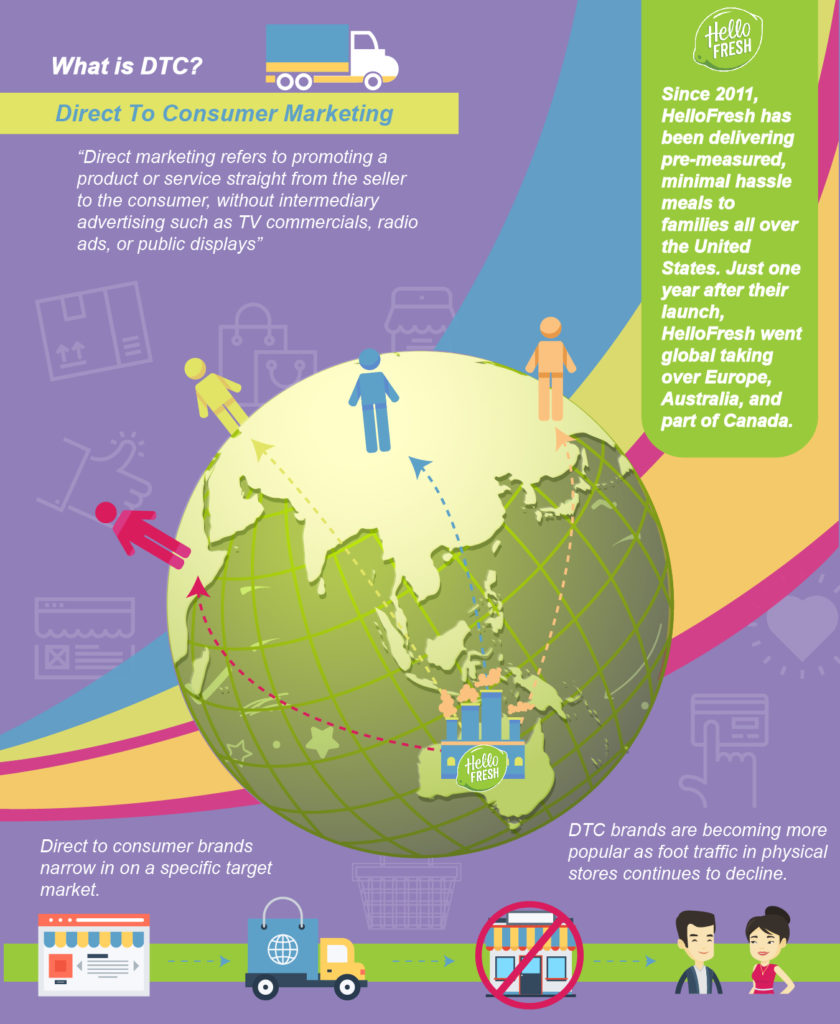
For years, companies have relied on brick and mortar stores to sell their products to consumers. With the creation of online businesses, the digital age has brought changes that allow consumers to buy directly from companies, eliminating the middle man. Companies like HelloFresh market online, sell directly to consumers, and have weekly meal plan services. They are part of a new wave of marketing called direct to consumer (DTC) brands. Direct to consumer refers to promoting a product or service straight from the seller to the consumer without intermediary advertising such as television commercials, radio ads, or public displays. DTC brands narrow in on specific target markets as foot traffic in physical stores continue to decline. Since 2011, HelloFresh has been delivering pre-measured, minimal hassle meals to families all over the United States. Just one year after their launch, HelloFresh went global, taking over Europe, Australia, and part of Canada. Just a few years later, they are now a multimillion billion-dollar company. These meal kits are delivered fresh weekly to subscribers. These subscribers have the option to include the number of people in their family to guarantee the right amount of meals. Meals are tailored to each family’s preferences with over 5,000 options and also provide several vegetarian and gluten-free meal options.
has brought changes that allow consumers to buy directly from companies, eliminating the middle man. Companies like HelloFresh market online, sell directly to consumers, and have weekly meal plan services. They are part of a new wave of marketing called direct to consumer (DTC) brands. Direct to consumer refers to promoting a product or service straight from the seller to the consumer without intermediary advertising such as television commercials, radio ads, or public displays. DTC brands narrow in on specific target markets as foot traffic in physical stores continue to decline. Since 2011, HelloFresh has been delivering pre-measured, minimal hassle meals to families all over the United States. Just one year after their launch, HelloFresh went global, taking over Europe, Australia, and part of Canada. Just a few years later, they are now a multimillion billion-dollar company. These meal kits are delivered fresh weekly to subscribers. These subscribers have the option to include the number of people in their family to guarantee the right amount of meals. Meals are tailored to each family’s preferences with over 5,000 options and also provide several vegetarian and gluten-free meal options.
Direct to consumer brands such as HelloFresh look to simplify shopping for consumers with proportioned ingredients and a step-by-step instruction sheet. This meal kit service not only helps busy families gather together for a meal, but HelloFresh also aims to make cooking enjoyable and reduce the costs of eating out.
 Today, HelloFresh is fully committed to serving their customers through these challenging times. Protecting the health and well-being of all HelloFresh employees and customers is their top priority, which is to provide fresh, healthy meals through no-contact deliveries. Along with other food suppliers, they have been classified as “critical infrastructure” by the Department of Homeland Security and as an “essential business.” All their facilities are SQF certified, which is the highest level of food safety certification. They also have implemented additional safety measures, including increased sanitation, hand sanitizer stations, and more frequent mandatory handwashing. All employees must now always wear facemasks.
Today, HelloFresh is fully committed to serving their customers through these challenging times. Protecting the health and well-being of all HelloFresh employees and customers is their top priority, which is to provide fresh, healthy meals through no-contact deliveries. Along with other food suppliers, they have been classified as “critical infrastructure” by the Department of Homeland Security and as an “essential business.” All their facilities are SQF certified, which is the highest level of food safety certification. They also have implemented additional safety measures, including increased sanitation, hand sanitizer stations, and more frequent mandatory handwashing. All employees must now always wear facemasks.
Direct to consumer marketing is nothing new; it has been around for a while, just in different ways. For example, mail-order catalogs gave consumers a first look at DTC. People would get a pamphlet of products, and they could purchase directly from the merchant precisely what they wanted for mail delivery. DTC is the new mail order catalog; consumers can instantly buy a product from an online supplier and receive the product in the mail instead of having to go into a store. Millennials are the leading group that uses DTC; it ticks all the boxes millennials usually go for according to Meredith Wood in her article titled “What Is D2C Marketing and Why Do Millennials Love It So Much?”. The main priorities of millennials shopping; convenience, low cost, authenticity, and a seamless shopping experience. DTC brands do just those things; as a brand online, they offer convenience while shopping. Instead of finding an associate in the store and them finding the product you want, you can type it into the search bar online or add filters to a specific category on their website. Most online stores have sales all the time, or a continuously growing clearance category, making it sometimes low cost to shop online instead of in the stores. Authenticity in online shopping is always there; you can read the brand’s story and how the brand came about on their website, instead of going into the store and not knowing the values the store holds. DTC is more personal than regular marketing; it gives the consumer a look into the company and makes them feel more comfortable.
During this unprecedented time, DTC is the new norm. Stores being closed, and more and more people are shopping online or ordering food to their house. Restaurants are closed, malls are non-essential, and you can now do grocery shopping online and pick it up. The world around us is changing and adapting to the times; DTC marketing is the future. If you have a business that could utilize Direct to Consumer Marketing, now would be the best time to get into it, then continue to use it in the future.
Multimedia Marketing Group has worked with numerous DTC brands. We have assisted them with their social media platforms, brochures, website development, infographics, and videos, to name a few. If your brand needs help with transitioning to a new marketing strategy, please don’t hesitate to reach out to Mr. Arco on LinkedIn here:https: /www.linkedin.com/in/joseph-arco-2353b414/
President, Multimedia Marketing Group Distinguished 20+ year career introducing Marketing strategies to drive growth within intensively competitive markets, an expert in creating the vision, identifying opportunities, creating high-quality products and services, delivering strong revenues and profits, and positioning start-up and existing businesses for sustainable growth. LinkedIn https://www.linkedin.com/in/joseph-arco-2353b414/
Multimedia Marketing Administrator
First coming into the Multimedia Marketing Group as a college media intern and then establishing herself as a Multimedia Marketer. Serena has found her passion within the Business of Marketing and seeing the invisible and making it visible through compelling storytelling with social media. Her cornerstone working philosophy is that “Action is almost always better than inaction.” This enthusiasm has led her through multiple media platforms for the clients served by MMG. Her excitement to share the final story outcomes of the creative endeavors by the MMG team has led to quantifiable business results for the leaders of the companies in which the Multimedia Marketing Group serves. MMG is a full-service marketing and media production firm servicing the Business-to-Business marketplace in retail, service manufacturer, and the non-profit sectors.



Recent Comments